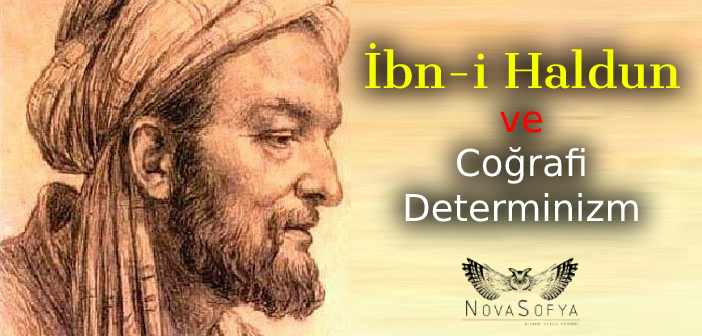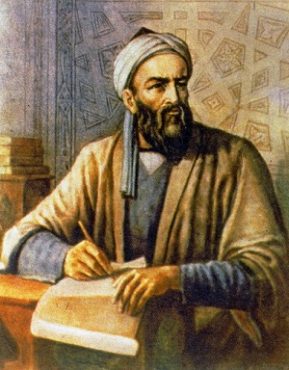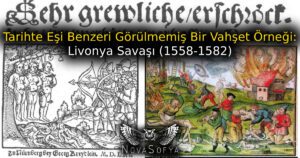Ibn Khaldun and Geographical Determinism

To what extent is man affected by the natural conditions in which he lives? Is geography destiny? What are Ibn Khaldun’s thoughts on the effect of geography on man? Why have societies gone through different stages of development in the historical process? Such questions have been examined by various philosophers, scientists and researchers throughout history. The results of the comprehensive examinations carried out to date lead to the conclusion that there is a dominant relationship in the triangle of human, society and nature. Humans and societies have lived under the yoke of nature in almost every stage of history and have had to adapt to it. Is this picture, then, an inevitable fate for human beings? Let us begin with Ibn Khaldun and his thoughts.

Ibn Khaldun, whose real name is Abu Zayd Abdurrahman, belongs to a well-established family whose lineage is based on the Yemeni Arabs. He was born in 1332 in the city of Tunis, spent his childhood here, taking lessons from important scholars. He served in the service of the Merini sultans and served as a sealer, pilgrim, clerk and vizier in the palace.
Ibn Khaldun, who lived in Morocco, Ifrikiye, Tilemsen and Girnata for a while, wrote the Muqaddimah between 1374 and 1378. After a stay in Tunisia for a while, he went to Cairo, Egypt. In addition to scientific education in Cairo, she mostly served as a woman. He spent the remaining 24 years of his life there and died in Cairo on March 17, 1406. Thus, Ibn Khaldun had the opportunity to observe different social and political events thanks to his living in the vast region from Andalusia to Egypt and holding various positions in the state levels.
The reason why Ibn Khaldun is so important in philosophical and historical literature is his emphasis on a kind of geographical determinism. Ibn Khaldun in his Muqaddimah; human and environment interaction, the spread of states and nations, general characteristics of nomadic and settled cultures, rural and urban life, population and various issues such as geography has been examined. Ibn Khaldun dealt with the aforementioned issues together with his evidence and explained the geographical factors affecting this situation. In the work in question, he does not only deal with human issues, but also explains the external factors that affect these issues. For example, he examines the civilization regions of the earth in general terms and suggests that climatic factors in these regions influenced the development of man and civilization.
Ibn Khaldun’s views on geography and the relationship between human beings are based on the religion of Islam. As a matter of fact, Islamic scholars such as Ghazali, Kindî and Masudî before him examined the relationship between nature and man. Some scholars have associated this with fate, while others have approached it from a more philosophical point of view using the concept of illiyat.
If we examine Ibn Khaldun’s deterministic views, we see that the essence of the matter is man. Man is a being who is directly integrated with his environment, affected by the geographical conditions of the region in which he lives. Ibn Khaldun, while dealing with man in the Muqaddimah, approached him from this point. For example, he divided the earth into seven climate zones and emphasized the importance of climate in the development of societies in these regions. According to the author, although climatic conditions affect people physically, spiritually and morally, they have determined the distribution and development of civilizations, states, cities and towns, which are a human product.
In the context of nature and man, Ibn Khaldun considers the seven climatic zones in three groups in general. In the first group there are 3rd, 4th and 5th climatic zones that are suitable for civilization. These regions contain the most favorable climatic conditions for man. Again, the 2nd and 6th climatic regions are relatively civilized and suitable for human nature. The 1st climate zone in the south and the 7th climate zone in the north are areas that are not suitable for civilization and where social life does not develop. Again, the population and urbanization of these areas proceed in parallel with the climatic conditions in which they are located. Civilizations develop better in places where climatic conditions are most favorable.
According to Ibn Khaldun, those who are most conducive to the development of civilizations are in the fourth climate zone; that is, the Mediterranean islands, Andalusia, Southern Italy, Mesopotamia, Maveraünnehr airland, etc. are the middle belt. Each of the communities living in these areas reflects its own characteristic appearance. There is a tight relationship between temperature and human skin color. 1. Climate zone people have a black skin color, while people living in the 7th zone have a very light color due to the low influence of the sun. In this context, the external appearance of people is related to geographical conditions rather than genetic inheritance.
However, climate has nothing to do with outward appearance, but also affects people’s moods. According to Ibn Khaldun, temperature and humid air, which are the basic elements of the climate, cause some changes in people’s bodies and indirectly affect people mentally and emotionally. In this context, in regions with hot and cold climates; He suggested that there were some emotional differences in people living on the coast, in the mountains and in high areas.
For example, blacks; they are light and hasty in their work, and too fond of pleasure and enjoyment. In fact, they are very fond of dancing and therefore like to dance to whatever music they hear. Because in the equatorial regions, the temperature is embedded in the physiological and characteristic structures of the blacks. Because of these characteristics, Ibn Khaldun states that black people are described as “idiots” in many places.
According to Ibn Khaldun, the main reason for this situation is the effect of temperature on the human body. Because heat expands the air and vapor and penetrates into the atoms, increasing their number. Ibn Khaldun, who wrote that the best example of the situation in question was observed in the baths, wrote that the warm air of the baths entered the souls of the people and gave a feeling of refreshment and enjoyment in the body.
Thus, a state of relaxation occurs in the body of people living in hot climates with the effect of temperature. According to Ibn Khaldun, this is why people who enter the baths become cheerful under the influence of the heat and begin to sing with the feeling of happiness. According to Ibn Khaldun, this is the basis of the black people’s fondness for pleasure as asserted above.
Another view that leads us to evaluate Ibn Khaldun as a determinist is that he suggested that the type of nutrition affects people physically, spiritually and morally. As a matter of fact, according to Ibn Khaldun, there is a close relationship between the food taken into the body and the physical and mental structure of the human being. In this respect, differences in abundance and nutrition are observed between nomads living in the countryside and people residing in the city living in fertile plains in terms of foodstuffs. These differences in dietary habits affect people’s body structures, minds and temperaments.
According to Ibn Khaldun, there is a change and metamorphosis in every aspect of life. According to him, the customs and traditions of nations and societies; The state of the state and cities does not follow a stable process. Historical and human events change over time. According to Ibn Khaldun, these changes and metamorphoses do not occur randomly. On the contrary, these changes and metamorphoses take place according to certain laws. For example, camels were the main factor that drove the Bedouin Arabs to live in the Sahara. Because camels, which have adapted to desert conditions, feed on desert plants. In this respect, due to the fact that they lived in deserts for a long time, desert conditions became the customs and habits of the Bedouins, which permeated their nature and temperament and made them savage.



